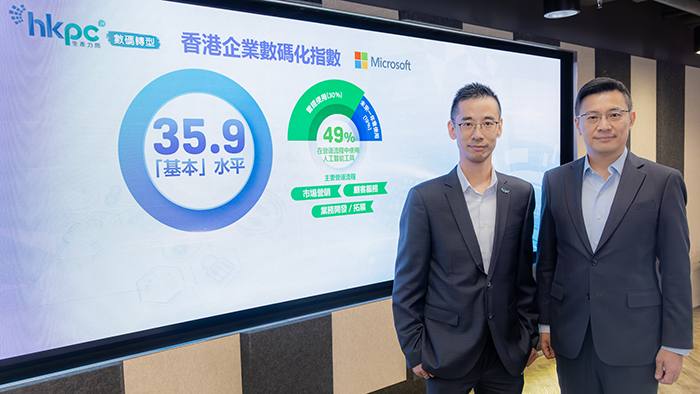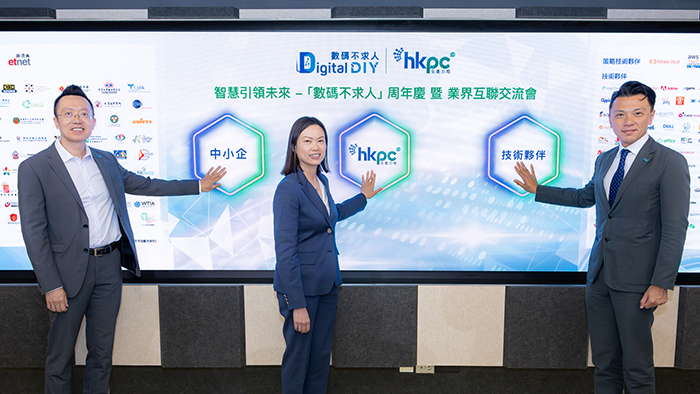HKPC Digital Transformation Reveals “Hong Kong Enterprise Digitalisation Index Survey” Results Overall Enterprise Digitalisation Index in Hong Kong Stands at 35.9 Indicating a “Basic” Level Adoption of Artificial Intelligence Tools in Operations to be a Surging Trend
(Hong Kong, 4 October 2023) The Hong Kong Productivity Council Digital Transformation (HKPC Digital Transformation) today announced the “Hong Kong Enterprise Digitalisation Index Survey” (“Enterprise Digitalisation Index”). The survey results revealed that the overall enterprise digitalisation index in Hong Kong stood at 35.9, categorised as “Basic”1 level, reflecting that Hong Kong enterprises are aware of the importance of digitalisation and have started adopting digital technology in certain operation processes, but such adoptions are still in the early stages. With the increasing prevalence of artificial intelligence (AI) technology, 30% of surveyed enterprises are currently utilising AI in various areas of operations. The number is projected to surge by 20 percentage points to approximating 50% next year, indicating that leveraging AI in operation processes is becoming mainstream.
“Enterprise Digitalisation Index” Survey Results
The survey results revealed that the index for large enterprises was 52.4, categorised as “Mature”, surpassing Small and Medium Enterprises (SMEs) (33.9) by 18.5 points. Among the six surveyed industries2, "Information and Communications" industry ranked top in the industry digitalisation index at 49.3 points, and it was the only industry approaching the “Mature” level. It was followed by “Financing and Insurance” industry (40.0), “Accommodation and Food Services” industry (35.0), “Import/ Export Trade and Wholesale” industry (33.9), and “Professional and Business Services” industry (33.0). “Retail” industry was the industry with the lowest industry digitalisation index of only 31.3. In terms of sub-indices, all fell within the “Basic” level, with “Process Digitalisation and Automation” ranked top (41.2) which surpassed the 40-point threshold. It was followed by “Digital Marketing and Customer Management” (38.9), “Culture and People” (34.3), and “Investment” (33.1). The lowest sub-index was observed in “Use of Data”, at only 32.0.
In terms of sales and marketing channels, 90% of enterprises started digital marketing and customer management. Over half (54%) of them had already built websites or social media platforms for digital marketing and customer management, though promotional strategies were not in place. Additionally, less than 10% of these enterprises used smart customer relationship management (CRM) for personalised real-time sales. In terms of store operations, over half (52%) of the surveyed enterprises were primarily relying on manpower or simple computer software to manage their stores. Only around 10% of enterprises enhanced service quality through the use of digital tools such as robots, QR code ordering, and self-checkout cashiers, indicating significant rooms for improvement.
The survey results also found that among the enterprises currently investing in business digitalisation, over 80% allocated 20% or less of their total investment towards digitalising their business, reflecting the lack of funding as a major barrier to digital transformation. Besides financial constraints, preference to maintain the status quo (46%) and difficulties in integrating new technologies into current businesses or existing systems (25%) were other challenges faced by the enterprises.
Mr Alex CHAN, General Manager, Digital Transformation Division of HKPC, said, “The Hong Kong Enterprise Digitalisation Index is at ‘Basic’ level, indicating that enterprises recognise the importance of digitalisation and have started leveraging digital technology in certain operation processes. If enterprises could develop comprehensive digital strategies, it is positive that they would reach the ‘Mature’ level in the near future. Results of the survey also reflected that enterprises of different sizes are facing various difficulties in digital transformation, such as the lack of funding and the difficulties in technology integration, which hinder the realisation of ubiquitous digitalisation. In particular, a significant 65% and 41% of enterprises expressed their desire for financial assistance, as well as ready-to-use and simple digital transformation solutions, respectively, to further promote digitalisation in various operation processes. Additionally, 36% of enterprises considered technical consultation and support necessary for driving digitalisation. As the best partner for Hong Kong SMEs, HKPC has been committed to assisting local enterprises through the ‘Digital DIY’ (DDIY) Portal. We have successfully gathered over 250 digital solutions, 200 successful case studies across various industries, and more than 100 technology partners, to empower SMEs to undergo seamless digital transformation, enhance operational efficiency, and explore new business opportunities. Moreover, HKPC's ‘SME One’ programme also supports the continuous development and competitiveness enhancement of Hong Kong SMEs and startups, which is believed to contribute to a more effective digital transformation for enterprises.”
Thematic Survey Results: AI Tools
The thematic survey explored enterprises’ current adoption of AI tools and its future trends. The findings revealed that 43% of enterprises had utilised AI tools, including chatbots (20%), Optical Character Recognition (OCR) (19%), text generators (14%), image generators (12%), and speech-to-text tools (12%) and it is expected that these tools will continue to be the trend in the coming year. In particular, the growth rates of various generative AI tools such as text generators, image generators, document/presentation generators, video generators, and voice generators exceeded 40%. This indicates that generative AI tools will be widely used. Currently, only 30% of enterprises have integrated AI tools into their operation processes, such as marketing and customer services. However, such kind of enterprises would reach nearly 50% within the following year, with the adoption of AI tools in marketing, customer service, and business development/expansion poised to become the mainstream.
The survey also examined whether enterprises had established guidelines covering various aspects such as personal data privacy and intellectual property when using AI tools. Mr Alex CHAN added, “Over 60% of the enterprises using AI tools have developed relevant guidelines, reflecting their awareness of the potential issues and responsibilities associated with AI technology, and their emphasis on the importance of managing the use of AI technology. On the other hand, the lack of knowledge in establishing guidelines for using AI tools may be one of the reasons hindering enterprises’ adoption of AI tools. When implementing AI technology, enterprises should establish Responsible AI guidelines to ensure the proper use of AI tools among employees.”
Mr Alex CHAN continued, “Over 80% of the surveyed enterprises indicate that the use of AI tools meets their expectations when it comes to enhancing productivity. However, nearly 40% of the enterprises believe that their employees are not proficient in utilising AI tools, highlighting the need for enterprises to provide more training to enhance their employees' skills in using these tools effectively, so as to maximise the benefits brought along with utilising AI tools. The ‘Reindustrialisation and Technology Training Programme’ (RTTP) is a funding programme under the ‘Technology Talent Scheme'. HKPC provides over 150 RTTP approved programmes per year that aim at subsidising local enterprises on a 2:1 matching basis to train their staff in advanced technologies. Effective training is believed to further enhance productivity and accelerate the pace of digital transformation for enterprises.”
Mr Peter LEE, Head of Commercial Business of Microsoft Hong Kong said, “The pace of work has experienced an exponential increase, placing greater pressure on businesses due to more limited access to resources. However, AI technologies can help automate routine tasks, streamline business workflows, and provide valuable insights to help alleviate the burden across previously time-consuming business areas. In a recent study by Microsoft3, early adopters of technology are four times more likely to have high confidence in their future business success. Our enterprise-grade solutions can swiftly address concerns regarding IT talent scarcity and the knowledge gap. As the economy gradually rebounds, businesses that adopt AI are expected to remain competitive and resilient, gaining a first-mover advantage.”
The event, “Leading the Future with Intelligence – DDIY Anniversary Celebration and Industry Interconnection Conference”, was also held on the same day. Ms Maggie WONG Siu-Chu, Director-General of Trade and Industry of the HKSAR Government, Hon Sunny TAN, Chairman of HKPC and Mr Edmond LAI, Chief Digital Officer of HKPC, officiated the networking event, which attracted over a hundred participants and focused on the crucial role of AI technology in digital transformation. It included a keynote speech, a panel discussion, and case studies, delving deep into the empowering effects of AI in future work models and how industry interconnection should be driven to deliver comprehensive advantages to support the growth of emerging smart industries. To assist SMEs in finding suitable digital solutions more efficiently, ‘DDIY’ Portal will be launching a brand-new AI digital assistant service.
To further promote digital transformation among enterprises and address industry pain points, HKPC and the Trade and Industry Department collaborate to organise the “Tech + SME Sourcing Fair 2023” from 10 to 11 October. More than 50 startups will showcase various technological solutions, including AI, robotics, cyber security, business intelligence and analytics tools, cloud computing, and workflow management. The event will also feature thematic seminars and free consultations, allowing SMEs to gain insights into practical technology solutions, cross-border e-commerce opportunities, Government funding and support, ESG trends, and other topics to facilitate sustainable business development.
The “Hong Kong Enterprise Digitalisation Index Survey” is supported by Microsoft Hong Kong and independently conducted by HKPC Digital Transformation. The survey was conducted in August and September 2023 and successfully interviewed 508 local enterprises by phone. The report is available for download from the HKPC website (in Chinese only).
1 The index is divided into four levels, ranking from high to low as follows: “Leader” (76-100), “Mature” (51-75), “Basic” (26-50) and “Laggard/ Unprepared” (0-25)
2 The six major industries include “Information and Communication”, “Financing and Insurance”, “Accommodation and Food Services”, “Import/ Export Trade and Wholesale”, “Professional and Business Services” and “Retail”
3 Source: “Microsoft SMB Voice and Attitudes to Technology Study 2022”: https://blogs.microsoft.com/blog/2022/09/08/microsoft-study-small-and-medium-sized-businesses-growing-fast-by-embracing-digital-technologies/
- Ends -
 At the press conference of the “Hong Kong Enterprise Digitalisation Index Survey”, Mr Alex CHAN, General Manager, Digital Transformation Division of HKPC (left) and Mr Peter LEE, Head of Commercial Business of Microsoft Hong Kong (right), announced that the overall enterprise digitalisation index in Hong Kong stood at 35.9, categorised as “Basic” level.
At the press conference of the “Hong Kong Enterprise Digitalisation Index Survey”, Mr Alex CHAN, General Manager, Digital Transformation Division of HKPC (left) and Mr Peter LEE, Head of Commercial Business of Microsoft Hong Kong (right), announced that the overall enterprise digitalisation index in Hong Kong stood at 35.9, categorised as “Basic” level.
 Ms Maggie WONG Siu-Chu, Director-General of Trade and Industry of the HKSAR Government (middle), Hon Sunny TAN, Chairman of HKPC (right) and Mr Edmond LAI, Chief Digital Officer of HKPC (left), officiated the “Leading the Future with Intelligence – DDIY Anniversary Celebration and Industry Interconnection Conference”.
Ms Maggie WONG Siu-Chu, Director-General of Trade and Industry of the HKSAR Government (middle), Hon Sunny TAN, Chairman of HKPC (right) and Mr Edmond LAI, Chief Digital Officer of HKPC (left), officiated the “Leading the Future with Intelligence – DDIY Anniversary Celebration and Industry Interconnection Conference”.
Share the latest information of HKPC to your inbox

 LANGUAGE
LANGUAGE